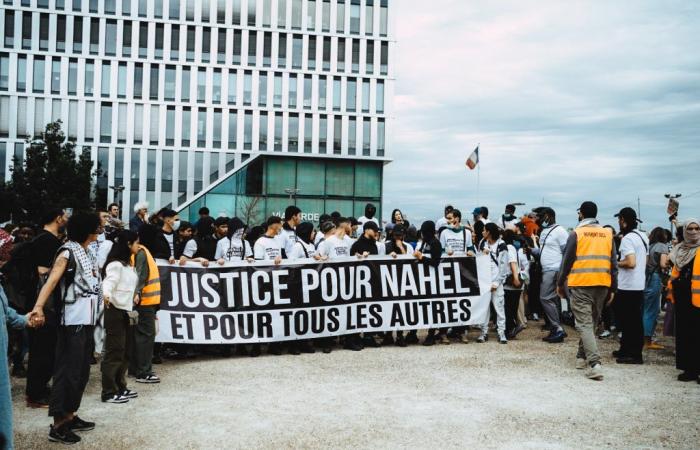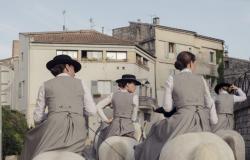If silence has replaced the noise, the anger remains unchanged. One year to the day after the white march organized by Mounia Merzouk, the mother of young Nahel, shot dead on June 27, 2023 by a police officer during a road check, only whispers are heard on the General de Gaulle esplanade, in Nanterre, where a new march is about to start. Twelve months earlier, thousands of people crowded the neighborhood to support the family of “this young person that the whole neighborhood knew and appreciated”, underlines a resident. The rally continued all night amid smoke from fires and tear gas. But this Saturday, June 29, 2024, the rage combines in calm. And bitterness.
On the same subject : In Nanterre, a long night of anger
In front of the Crédit Mutuel sign which burned down last year, and whose frontage has not been repaired, young people take out of a box the white t-shirts that they will wear all afternoon. “Take some, they’re free, everyone should wear them today”circulates a mother from the Pablo Picasso district. His famous towers rise behind the business district of La Défense. The crowd, which does not exceed a thousand people, forms a single procession. It is time for meditation. The bells of the esplanade ring 2:00 p.m. About sixty young people surround Mounia Merzouk. All have, engraved on their outfits, “Justice for Nahel, born 02/25/2006, executed 06/27/2023.”
What I saw during the Yellow Vest protests, I will have nightmares about it all my life. I have blood in my memories.
Alexis watches the procession get into place. “My grandfather lives in Pablo, it was important for me to come here,” he explains. He traveled from the neighboring department of Val-d’Oise, where he lives. Last year, he was unable to join the demonstrations which set France ablaze for several days. “I was working part-time in restaurants, it was too complicated,” regrets the one who ensures, today, “to hold all the demonstrations, those against the RN, those against Macron, in support of Palestine, everything.” A lady is listening. Her name is Nathalie. “What affects this child, affects mine too,” points out the mother of three children, including a teenager. “I live in Les Beaudottes, in Sevran, the district classified as the second most dangerous in France!” she quips, regaining her seriousness a few seconds later, as the march starts.
“Where is the Republic? »
“The media is always talking about violence and racism in working-class neighborhoods. But look at the report where the journalist is wearing a kippah and everyone is polite to him!” says the woman who worked for a long time in cultural action in Nanterre. She refers to a report made by a journalist from Envoyé spécial in 2015. She continues: “What I saw during the Yellow Vest demonstrations, I will have nightmares about it all my life. I have blood in my memories. Where is the Republic?” she asks.
Many have in mind the first round of the legislative elections the next day. But the instruction, given this week on the “Justice for Nahel” Instagram account, was not to mix this election too much with the event. “Propaganda”, prohibited on the eve of an election, would have disrupted the progress of the rally. “We will not comment out of respect for the only person who needs to be heard today, Nahel’s mother,” slips the first deputy mayor of Nanterre, Zahra Boudjemaï. Several politicians are present: the former president of the rebellious group in the National Assembly, Mathilde Panot, the new LFI MEP, Rima Hassan, or the rebellious Éric Coquerel, but also Anasse Kazib, candidate in Seine-Saint-Denis.
“Gérald Darmanin is already the extreme right, in truth”
Despite this instruction, the shift to the right of power is very often pointed out by those present. “Gérald Darmanin is already the extreme right, in truth,” regrets Alex, 30 years old. “But if the RN passes, it could get worse,” he fears, pointing in particular to the self-defense that the police would use to justify their violence. He is afraid that she will become ” automatic “, while 21 people have been killed during a traffic stop since 2020.
We must fight, despite the injustice, despite the racism…
Hamid, 30 ans
Marie* also perceives the fascistization of power. “Racists already attack black people and Arabs on a daily basis… Now that they feel like they have wings, as soon as I see a veiled woman walking alone in the street, I try to stand next to her,” she describes. Her son, black, aged 45, did not come home last night. “Before, I would have thought he must be enjoying himself. Now, I was scared to death,” she sighs.
A fear that does not erase determination either. As the procession begins its march towards the Nelson Mandela esplanade, the signs “No justice, no peace!” and “Justice for Nahel” intertwine. Mélissa, 23, remains combative. “Whatever happens, we must be on the streets and never let our guard down,” explains the one who grew up in the Pablo Picasso district. A resistance that Hamid, 30 years old, born in Nanterre also shares. He is a fishmonger for several markets in Île-de-France. He sleeps in his car. “We must fight, despite injustice, despite racism…” he lists, evoking a bar in Paris which refused him “because of the beard.”
Many people present experience this discrimination on a daily basis. Every day, including in the media. Moreover, many young people prefer not to answer questions. ” You never know “, calmly evades one of them, too used to seeing “how we are treated on Cnews and everything”. A distrust that was already present at the time of last summer’s revolts, when the Bolloré galaxy was harping on authoritarian excesses and racist comparisons to talk about the inhabitants of working-class neighborhoods.
Take care of yourselves young people, the future is in your hands. You know very well what tomorrow holds. Wake up.
Mounia Merzouk
The crowd arrives at the esplanade. Everyone forms a circle around Mounia Merzouk and dozens of young people lined up next to her. Her voice trembles. Tears fall on her words. “Our children’s lives have value. It’s very, very hard for me, you know, knowing that the two police officers are outside and that I could run into them at any time. It tears me apart,” she struggles to confide, overwhelmed by emotion. Florian M., the police officer who shot Nahel, was released under judicial supervision in November. At the beginning of May, a reconstruction revealed the flaws in his defense, consisting of saying that he was only defending himself against the teenager.
“Take care of yourselves young people, the future is in your hands. You know very well what tomorrow holds. Wake up. We must avoid deaths, protect children,” she says, supported by applause. She is joined by an imam. “We are not all of the same religion, but believers or not, we are here to pay homage to Nahel,” he explains. A minute of silence begins. It is followed by a prayer. The gray sky lets a few drops fall. Some glances are cast towards the clouds. Like a message from “the beyond, of this paradise where Nahel is”, the imam had hoped a few minutes earlier.
“The fight is not over”
The police, the justice system, it has to change. They don’t have the right to shoot.
A young
A young person speaks: “Nahel, we all loved him. The police, the justice system, that has to change. They don’t have the right to shoot. Here, we got no response. The prefecture did nothing,” he points out, before Mounia Merzouk invites the crowd to retrace their steps to gather around a barbecue. There, Assa Traoré speaks. The sister of Adama Traoré, who died while being arrested by gendarmes in Beaumont-sur-Oise in 2016, harangues young people in front of her. “Working class neighborhoods have power. They are the hope of our country. I hope you have the endurance. Because the fight is not over. You have a responsibility: that these images do not fall into oblivion.”
A few meters away, a large poster signed with the Earth Uprising logo shows the scene that went around the world: a police officer holding his weapon facing a teenager driving a car. With the title: “€1,600,000, crime pays”, in reference to the kitty launched by the support of Éric Zemmour, Jean Messiha, and from which the police officer Florian M benefited. Could this same Jean Messiha integrate a far-right government if Jordan Bardella arrived at Matignon? There is only one answer to this. It is given by Assa Traoré. “The far right can come to power, but we can change things. For what ? Because we’re on the street. »
Receive Politis at your home every week!






